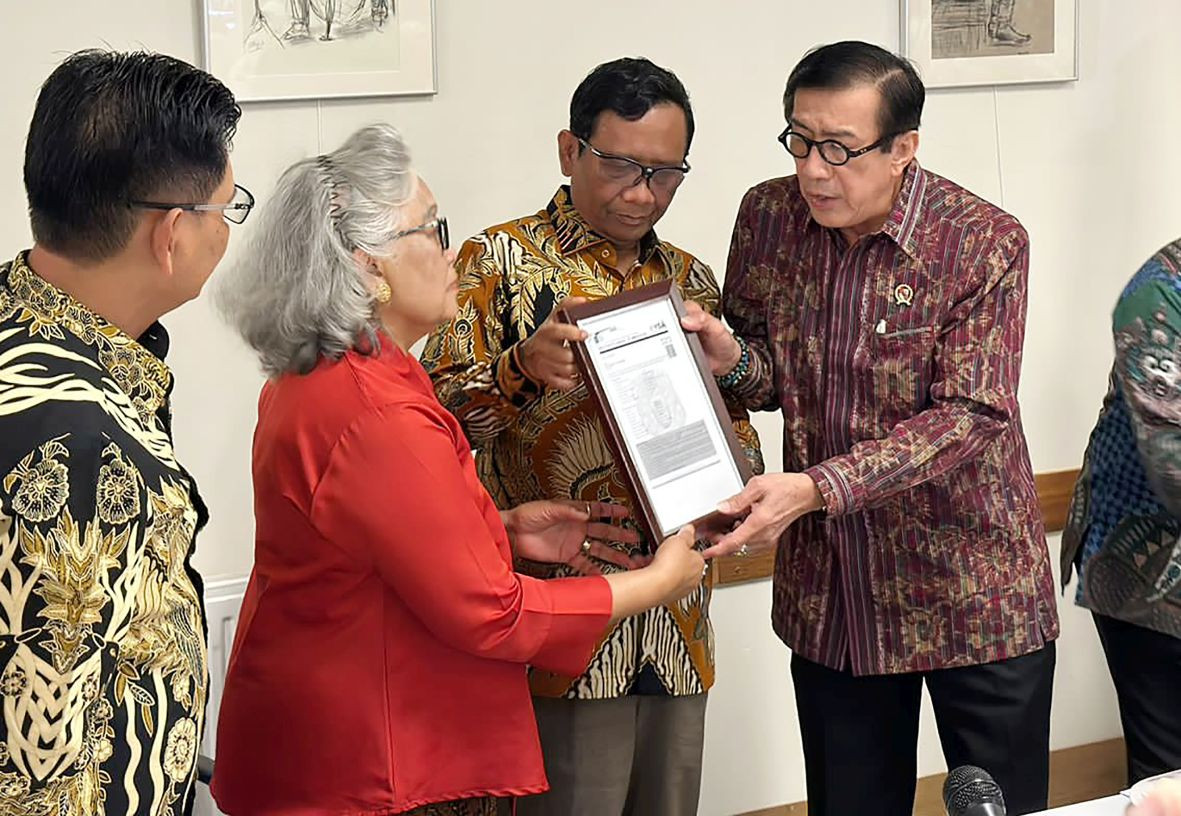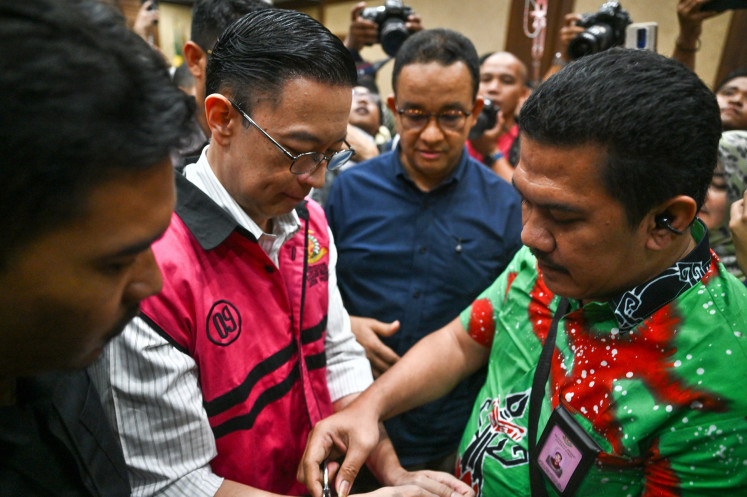Popular Reads
Top Results
Can't find what you're looking for?
View all search resultsPopular Reads
Top Results
Can't find what you're looking for?
View all search resultsGovt sidesteps call to revise dark history
Eurotrip ignores victims’ ‘sense of justice’.
Change text size
Gift Premium Articles
to Anyone
A
s the government seeks to make good on a promise to restore the rights of victims of past atrocities, the senior minister in charge has instead denied them a sense of justice by saying he is unwilling to set the record straight.
Two cabinet ministers are currently in Europe to speak with Indonesian political exiles, many of whom were stripped of their rights and forced to remain overseas after the 1965 attempted coup and the ensuing communist purge.
The exiled community applauded the efforts to restore the victims’ rights and afford them special benefits.
But they also appealed to the state to reveal the truth behind the forced termination of their citizenship and revise the history in which the Indonesian Communist Party (PKI) was squarely blamed for the coup attempt.
Coordinating Political, Legal and Security Affairs Minister Mahfud MD turned them down, however, by arguing that the onus was on the experts to do their bidding.
“Different regimes have different historical perspectives,” Mahfud told a meeting of political exiles in Amsterdam that was streamed online on Sunday.
“I would say… the government is able to provide grants to fund those willing to write history, but it is not the government’s stance [to reshape past events],” he said.
He also claimed that discrimination against those linked to the PKI no longer exists in the government, and considered any sentiment that has emerged as “commonplace”.
The minister’s remarks caused an immediate stir in human rights circles.
Amnesty International Indonesia (AII) executive director Usman Hamid lambasted the coordinating minister for trivializing the community’s demands for justice.
“I see no seriousness or sincerity in the state’s bid to resolve past rights violations, as the remarks do not reflect an understanding of human rights,” he stated on Monday.
Usman argued that the government should do the revising, as it is the state that has misused the facts to justify crimes against humanity during the New Order era and in the 1965 tragedy.
Nursyahbani Katjasungkana, who in 2016 organized the International People’s Tribunal on the 1965 Crimes Against Humanity (IPT 1965), said that the coordinating minister and his team lacked a “sense of justice” in their refusal to reveal the truth and rewrite the official narrative.
Disappointed, she told The Jakarta Post on Monday that the presidential decree on nonjudicial settlement of past atrocities was tantamount to “systemic state denial”.
Cast aside
Sunday’s meeting was the first of two stops for the nonjudicial rights settlement implementations team (PPHAM), with the second gathering being held in Prague on Monday evening.
On the trip, Mahfud is accompanied by Law and Human Rights Minister Yasonna Laoly and Gen. Teguh Pudjo Rumekso, secretary to the coordinating minister, who also leads the implementations team.
It is the first time the government has visited political exiles in person as part of a renewed commitment to right the wrongs of the past, a major policy shift for an administration that has long put human rights on the backburner.
In January, President Joko “Jokowi” Widodo surprisingly acknowledged and expressed regret over 12 gross human rights violations that occurred between 1965 and 2003.
They include the communist purge of 1965-66, in which, according to some estimates by historians and activists, at least 500,000 people were killed, and left more stranded overseas, stateless and disenfranchised.
At the time, the government launched a nationwide witch hunt to find those linked to the now-defunct PKI, barring hundreds of thousands of Indonesians from returning from overseas, including students on scholarships sponsored by then-president Sukarno’s administration.
According to the latest data, there are now at least 130 political exiles who were stripped of their citizenship in 1965 who are living abroad across 12 countries. Among them, the Netherlands and the Czech Republic are among those with the largest exile communities, with 67 and 14, respectively.
Dud promises
The Jokowi administration won early accolades for insisting that the nonjudicial settlement route would not preclude any attempts to resolve the gross rights violations through judicial proceedings.
But with an ad hoc human rights court acquitting a retired army officer tried for the 2014 Paniai shooting, another case about a gross human rights violation, activists and victims were hoping to make the most of nonjudicial efforts.
During the gathering in Amsterdam, officials extolled the benefits of nonjudicial settlements.
Some of the more outspoken individuals, like 79-year-old Sri “Ning” Budiarti, who resides in Aachen, Germany, were symbolically handed new benefits, including visa fee exemption and a temporary stay permit (KITAS), as well as the option to have their citizenship restored.
“Victims of human rights violations who reside overseas are to obtain visas and stay permits without having to pay,” said Minister Yasonna, moments before giving Ning a framed image of her free five-year multiple entry visa.
Like most of her contemporaries, Ning had her Indonesian passport revoked during her studies in eastern Europe.
But the situation “turned awkward”, Nursyahbani said, when 84-year-old exile Sungkono from Germany said he did not need just visa handouts.
“I hope that the government will not only restore our rights and provide various benefits but also uncover the truth and settle past atrocities through judicial means,” he said.
Sungkono was a scholarship awardee sent to study in Moscow in 1962, but had his passport revoked in 1966. He currently resides in the Dutch town of Amstelveen.










